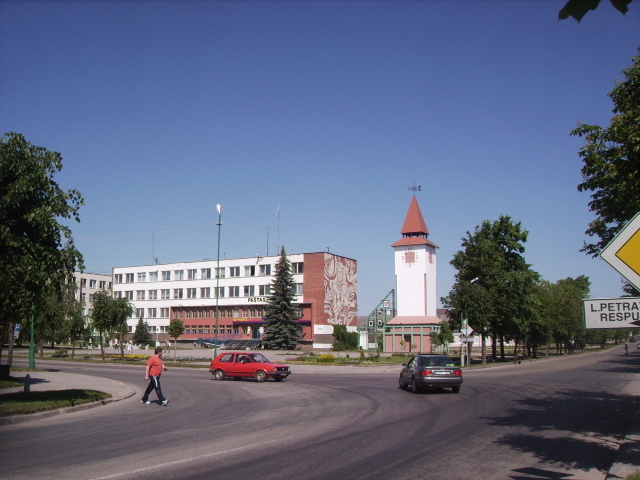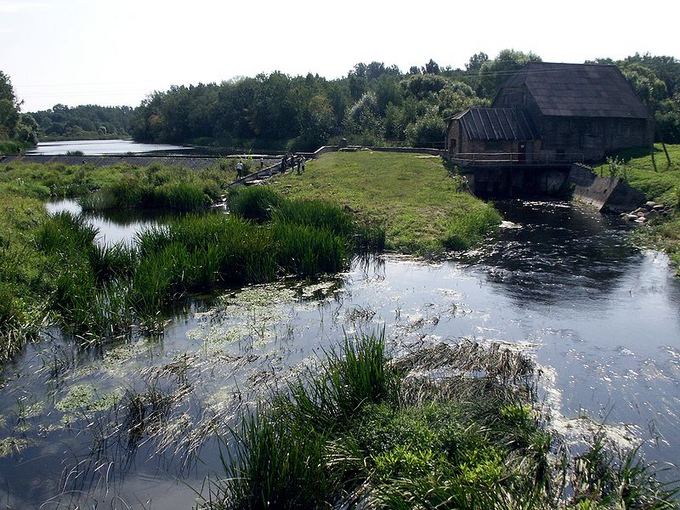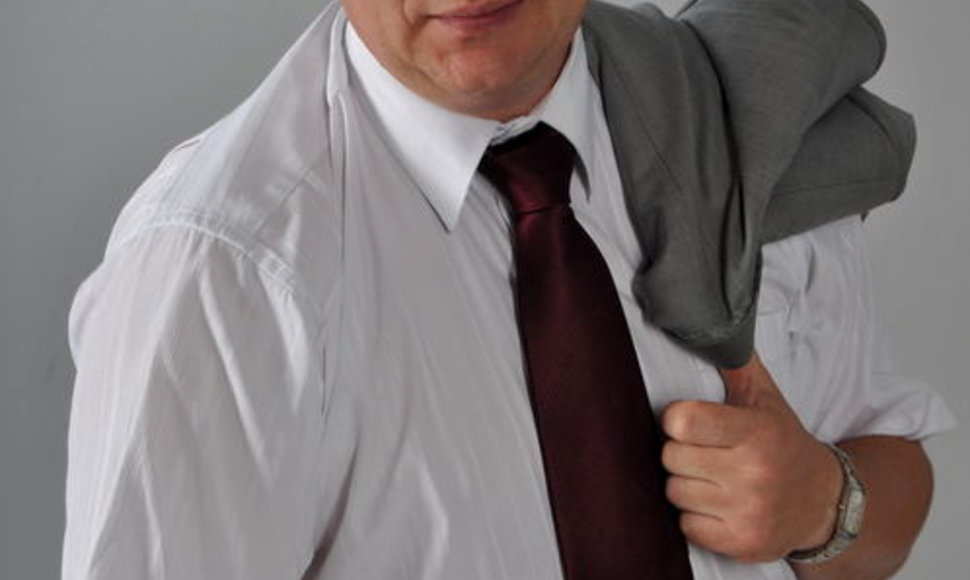Akmenė District is in the top ten of Lithuanian municipalities that have been most affected by emigration. Among the strongest push factors were the radical changes in the labour market after Lithuania transitioned from central planning to market economy and the region's economic decline.
For decades, Akmenė was known as the centre of construction industry, home to companies like Akmenės Cementas (Akmenė Cement), Venta Building Materials Factory which used to produce silicate bricks, slating plates, asphalt tiles, and other building materials. Akmenė quarries used to be exploited at full capacity.
For decades, Akmenė was known as the centre of construction industry, home to companies like Akmenės Cementas, Venta Building Materials Factory.
The big factories required intense labour, so many workers moved in and settled in Akmenė District over the decades before Lithuania's Independence. After the country seceded the Soviet Union, however, the construction industry fell into stagnation.
“For example, at its peak, Akmenės Cementas used to employ 3.5 thousand workers, whereas now the company's staff is only 580 people,” Mayor Mitrofanovas compares.
In the 1990s, giant previously state-run factories let go many of its employees who had to do what they could to stay afloat. Some took up small businesses popular at the time: they knitted sweaters and engaged in trade with Russia. But these were short-term solutions that helped put bread on families' table, but could hardly restart the region's economy.
“When it comes to unemployment, one can note that the situation is always worse in borderline regions. People found it hard to find a job, so they started looking westwards. When the opportunity presented itself, they left for the countries in the European Union, which we only dreamed about at the time, and mostly worked illegally,” Mitrofanovas recalls.
Lithuania joined the European Union in 2004, opening big new labour markets for its citizens. Akmenė was hit by the second wave of emigration. The third wave of departures came after 2008, when the country succumbed to the financial crisis and economic downturn.
 |
| Wikimedia/Naujoji Akmenė |
Every person a victory
Mayor Mitrofanovas is happy that demographic indicators have stabilized over the last three years. In 2012, for instance, the population in Naujoji Akmenė, the centre of Akmenė District of some 11 thousand people, went up by 70 people. The change has to do not just with a positive births and deaths balance, but with early signs of repatriation.
The mayor also notes that a generational shift is taking place in Naujoji Akmenė, a town only 65 years old. Twenty new employees, mostly young people, have started working in the municipality over the last several years. People come to work from other districts, too, the mayor intimates.
“We have an opening right now and there are eight applications for the post. One candidate is willing to move here all the way from Vilnius. Such things are both surprising and joyful.”
Apartment for every second person
The mayor is convinced that Akmenė is slowly but firmly getting back on its feet. Cooperation with state institutions and public agencies like Enterprise Lithuania and Invest Lithuania has been of great assistance in drawing the attention of potential investors.
Apartments in Akmenė are exceptionally cheap not because there are no jobs in the town, but because there are so many properties on offer.
“I've always said that we must start by giving a new image to the district. Unless we go out ourselves, looking for contacts and partners, nothing will happen. Some people from the older generation disagree with me. They stick to the old philosophy: the worse we look, the more money we'll get from the central government. But times have changed. We must understand that investors will not as much as look at us, if they see that every fourth inhabitant lives on social benefits, that real estate is cheap because it is derelict, etc.,” Mitrofanovas says.
He notes that apartments in Akmenė are exceptionally cheap not because there are no jobs in the town, but because there are so many properties on offer. Several decades ago, Akmenė underwent a construction boom, when blocks of flats sprang up in dozens.
“In the municipality, we have about 12 thousand apartments and a population of some 24 thousand, which means there is an apartment for every other resident. You can get a flat in a non-renovated house for 20 thousand litas (5.8 thousand euros), 15 thousand for a neglected one. Flats in renovated houses can cost about 40-60 thousand litas (11.6-17.4 thousand euros), while in the town centre, prices can go up to 70 thousand litas (20 thousand euros),” says Mitrofanovas, who has been heading Akmenė District Municipality since December 2008.
Seven million litas in saved benefits
Akmenė District Municipality is involved in an experiment. It carries out particularly thorough examination on everyone who applies for social benefits. Municipality representatives pay a visit to every applicant to check if they really need financial assistance from the municipal authorities.
By coincidence or not, the ranks of social benefits recipients has contracted by 30 percent over the last year and a half. Of the three thousand recipients the municipality had a few years ago, now fewer than two thousand remain. That translates into 7 million litas (2 million euros) saved by the municipal budget.
“Our experience implies that the national government wastes 400 million litas just because people exploit legal gaps and receive benefits for nothing. I know of cases when allegedly unemployed people sign up at the labour exchange in order to collect their benefits and then go abroad for three months,” the mayor shares.
In order to qualify for unemployment benefits Akmenė residents must do 40 hours of public service per week. “There are many discussions about this rule, but we are not planning to change the way we've been doing things for the last four years. Visitors to our district therefore often marvel at how clean our streets are – almost German-like order,” Mitrofanovas smiles.
Growth of industry without pollution
Akmenė District Municipality has drafted a strategy for attracting investment, but, according to the mayor, the document is concerned more with achieving indices than actual results. Therefore he plans to form a task force in order to find ways to make the strategy more efficient.
There were 311 business companies in Naujoji Akmenė in 2012. This year, there are 370.
“Today alone I received two astonishing phone calls: representatives of the Czech House of Commerce want to come next week in order to explore ways to cooperate with Akmenė region. Moreover, I had a call from the building materials chain Jupoja. They want to discuss their company's expansion here. That means we're on the right path,” Mitrofanovas says.
Next year, the municipality is planning a forum on investment opportunities. The guest lists should include commercial attachés from all Vilnius-based embassies.
 |
| Rimantas Lazdynas, Wikimedia/Hydroelectric power plant in Rudikiai, Akmenė district |
Another potential avenue for advancement is the planned Akmenė Free Economic Zone.
“The towns of Papilė and Akmenė, which are part of our municipality, will remain as historic-cultural sites, while Venta and Naujoji Akmenė will be industrial zones,” Mitrofanovas explains.
However, pollution associated with intense industry can deter young families who wish to live in a clean environment from settling in Akmenė District.
“We're taking part in European CO2 emissions reduction schemes. The European Commission has asked us to send representatives to Kazakhstan to make a presentation about our district as a small municipality that works to attract investment and fight pollution at the same time. This way we show to young people, who think we've got only dust, factories, and industry here, that our industrial development is carefully managed.”
PE teacher from Denmark
The mayor of Akmenė is confident that under his management, the district will become attractive to both business companies and expatriates who are waiting for opportunities to return home.
Mitrofanovas has suggested to the national government to introduce the concept of family business. If it were up to him, such businesses, with annual turnover of under 30 thousand euros, would be exempt from all taxes.
And he can already present some examples. “One woman, who had been working in Norway, returned to Akmenė with her children and her son-in-law who opened a bakery. One young man, who used to work in Sweden, is building a company that will make furniture.
“I have some personal experience with repatriation myself. One woman from Akmenė had a contract with a Danish football club, her mother and sister were also working in Denmark. When a position for a physical education teacher opened up in a local school, I rang her up, that athlete, and offered her the job. She accepted,” the mayor enthuses.
He assures that the municipality does all in its power to support starting entrepreneurs, waives real estate and land taxes.
Moreover, Mitrofanovas has suggested to the national government to introduce the concept of family business. If it were up to him, such businesses, with annual turnover of under 100 thousand litas (30 thousand euros), would be exempt from all taxes.
“Last year, our municipal budget target was 70 million litas. We had to collect 26 million ourselves, through taxes, and the remaining 44 million was supplied by the central government. By inviting businesses and taking steps to revive the economy, we managed to exceed our target by 2.5 million. So what does the government do? The following year, they set our target not at 26 million, but at 28.5 million and reduce their own contribution. So I ask them: why should we penalize businesses and industrialists by increasing taxes? The municipality might collect more revenue in that particular year, but after that, we will find ourselves in the same pit, we won't be attractive to investors. So I'd rather give everyone tax breaks and let the state pay what is its due. That will result in more jobs, fewer welfare benefits and compensations,” Mayor Mitrofanovas says.
As of 1 July 2013, unemployment in Akmenė District stood at 15.1 percent.













